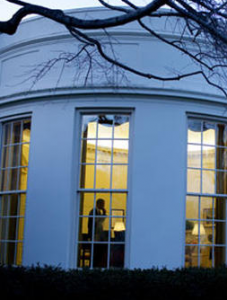If Hillary Clinton is elected in November, the parallels with the start of the George H.W. Bush Administration will be striking. That does not imply that Clinton’ presidency must follow the trajectory of his: history rarely echoes, and her luck as well as her personal qualities may prove different. But she will begin where he did.
Bush the Elder ran for president in 1980 as the favorite of his party. He had the longest resume, stood near the ideological center of the traditional GOP, had close ties with powerful leaders in business, government, and foreign capitals, and was the son of a US Senator. He lost to the insurgent Ronald Reagan, who represented “change.” Bush served loyally in the Reagan Administration and then ran to succeed his boss and uphold a legacy that he had not originally endorsed.
Hillary Rodham Clinton ran in 2008 as the favorite of her party, with a long resume, relationships comparable to Bush Senior’s, and the support of party regulars. She was the spouse of a former president and had helped him to define the ideological center of the New Democrats. She was defeated by an insurgent who represented “change,” but she then served loyally in his administration and is running to preserve his legacy.
Both candidates were distrusted by the ideological base of their party. Bush 41 had to beat Pat Buchanan in 1988. Buchanan turned out to represent a powerful strand in the future of the GOP. Bush promised “No new taxes” to satisfy his base. Clinton had to beat Bernie Sanders in 2016. The demographics of Sanders’ support suggest that he represents a major strand in the future of the Democratic Party. Clinton has made policy concessions to satisfy Sanders voters (and Black Lives Matter).
Mike Dukakis is a fine public servant and an exemplary person, but he ran a notably weak campaign against George H.W. Bush in 1988. Donald Trump cannot hold a candle to Gov. Dukakis as a human being, but Trump is also running a poor campaign.
Although both George H.W. Bush and HRC are capable, detail-oriented policymakers who are said to be impressive in private, neither has the kind of eloquence that leaves a mark on the language or memory. Bush Senior is known for “Read my lips” and “Message: I care.” I don’t think Hillary Clinton is yet associated with any particular phrases.
Bush 41 faced a Democratic Congress with formidable opposition tacticians, such as Senate Majority Leader George Mitchell. HRC is likely to face at least a Republican House in 2017, and probably a Republican Senate after 2018. In the face of congressional opposition, Bush achieved no changes in domestic policy other than a grand compromise on the budget that lost him the support of the Republican base. Clinton will have to negotiate budgets with the Republican House. Bush left a much bigger mark on foreign policy. Clinton has also demonstrated that she is willing to use executive power overseas. Both confront a war in and around Iraq
When Bush the Elder took office, an economic recovery was 7 years and three months old and had only 18 months left to run. When our next president takes the oath of office, the current recovery will be seven-and-a half years old and probably can’t last much longer. Both also inherit a party apparatus that is pretty tired after almost a decade in control of the executive branch.
Again, none of this implies or predicts that Clinton (assuming that she is elected) will follow the path of Bush Senior. New realities will confront her, and she has some freedom to act differently. But the parallels are a bit sobering and deserve some thought.



 India L. Gerald, Program Supervisor at Roxbury’s Youth and Police in Partnerships
India L. Gerald, Program Supervisor at Roxbury’s Youth and Police in Partnerships Robert Daum, Ph.D., Board of Directors of Reconciliation Canada
Robert Daum, Ph.D., Board of Directors of Reconciliation Canada
